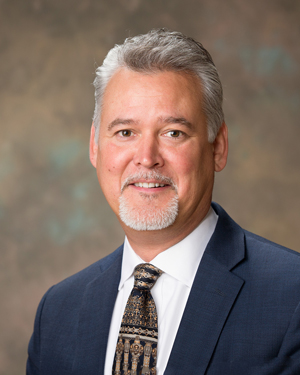About Marshfield Clinic Health System
Marshfield Clinic Health System is the largest private group medical practice in Wisconsin and one of the largest in the United States, with more than 1,200 medical providers representing more than 86 specialties and subspecialties. The system has more than 50 locations in 34 communities in northern, central and western Wisconsin, including hospitals in Marshfield, Eau Claire, Flambeau and Rice Lake. The clinic is advancing its acute care growth and deepening its level of integration as a system.
Carl Gustafson
Vice president supply chain
Marshfield Clinic Health System
Marshfield, Wisconsin
Born and raised in Woodstock, Illinois, Carl Gustafson served in the United States Army from 1988 to 1992. After his discharge, he began working in the chemical industry, formulating paints and coatings. In 1999 he entered the healthcare industry, working for a subsidiary of Monsanto. In 2001 he transitioned to acute operations, supporting pharmacy contracting and logistics. After a few years, he moved into surgical services as the business manager. Three years later he began supporting all of supply chain.
Gustafson considers his experience in pharmacy and surgery as invaluable, having lived the daily operations of those areas. He has opened two brand new hospitals and enjoys building the supply chain in a new facility. He joined Marshfield Clinic Health System in October 2016. He lives in Marshfield, Wisconsin, with his wife, Catherine, and two daughters, Paige and Olivia.
JHC: Can you describe the most challenging and/or rewarding supply-chain-related project in which you have been involved in the past 12 to 18 months?
Carl Gustafson: The planning and tactical implementation of a multitude of projects, new acquisitions and changes. The growth and development of our acute care strategy and system integration has made supply chain adapt quickly and be nimble. A sample of large projects completed over the last 18 months are:
- Implementation of a contract management philosophy, building new alliances with our vendor community, and developing contracts that support clinical excellence while reducing costs by 5 percent.
- Performing a chart of accounts conversion with Finance for several facilities within the health system.
- Acquisition of a 504-bed Level II trauma center.
- Conversion of our med/surg distributor.
- GPO analysis and conversion to Vizient.
- Support of provider-based billing, including conversion of 110,000 bins of medical supplies from cardboard to plastic.
- Support for a new hospital, scheduled to open in the summer of 2018, as well as planning for four additional new hospitals to be completed in the next four to five years.
- Item master cleanse.
- Implementation of a new EMR.
JHC: Please describe a project you look forward to working on in the next year.
Gustafson: Over the next year we are focusing on redesigning our distribution and logistics strategy to align with an agile, efficient and lean system. Over the course of a three-year period, Marshfield Clinic Health System will go from one hospital to seven, with potentially more opportunities on the horizon. Due to our continued growth, we will be pushing the current limits of our existing operation, which includes a 100,000-square-foot consolidated service center. We have to instill a solid foundation to support our continued evolution as a health system and will apply a continuous improvement mindset to reach the next level. This will be accomplished through education, technology improvements, organization, critical thinking and solid alliances with our vendor community.
JHC: How have you improved the way you approach your profession in the last five to 10 years? Did you have any help doing so, or was there any particular incident that was particularly significant?
Gustafson: Over the past 10 years, I have focused on Servant Leadership and having the desire to want to serve those around me. Employing Robert Greenleaf’s leadership style has changed who I am and how I support others. [Greenleaf was the founder of the modern Servant Leadership movement.] Being a leader is a blessing, as we have the opportunity to help others develop. This mindset has allowed me to build a solid team of professionals and significant business partnerships with vendors. Instilling a sense of urgency and great desire to perform at a very high level ensures we are taking care of the clinicians who take care of patients.
Many people along my career have significantly inspired me. While I was completing my bachelor’s degree, one of my professors encouraged me to enter into formal mentorships. I searched for leaders who exhibited strong values that matched what I was striving to improve. To date, I have had six yearlong formal mentorships, and I am extremely grateful to those who have given of their time to me.
JHC: In your opinion, what will be some of the challenges or opportunities facing the next generation of supply chain professionals? What should they be doing now to prepare to successfully meet those challenges and opportunities?
Gustafson: The perception of supply chain is slowly evolving, and it is up to us as leaders to effectively communicate the strategic value it brings to the organization. Most of the time, supply chain goes unnoticed; everything we do happens as if by magic. Changing that perception is important, because we are entangled in a very complex role in a very complex industry.
Supply chain professionals just entering the healthcare field need to understand the level of complexity we face, managing the “Bermuda quadrangle” of the distributor, GPO, manufacturer and facility. It is critical to embrace a continuous improvement mindset to solve the complex problems we face. New leaders will be challenged by a shortage of supply chain professionals, as other industries can pay higher wages to new graduates. To remedy this, it is important to develop educational goals and professional development for your teams using the Association for Healthcare Resource & Materials Management (AHRMM), APICS, Elsevier and other organizations for content. There are many creative ways to get quality educational material to your teams.

